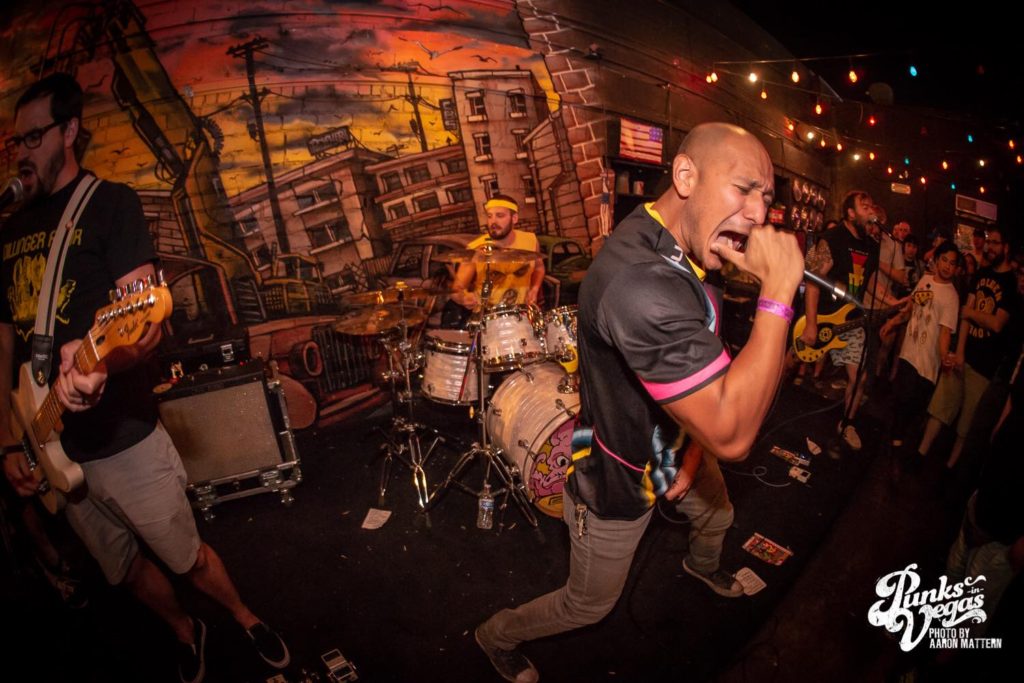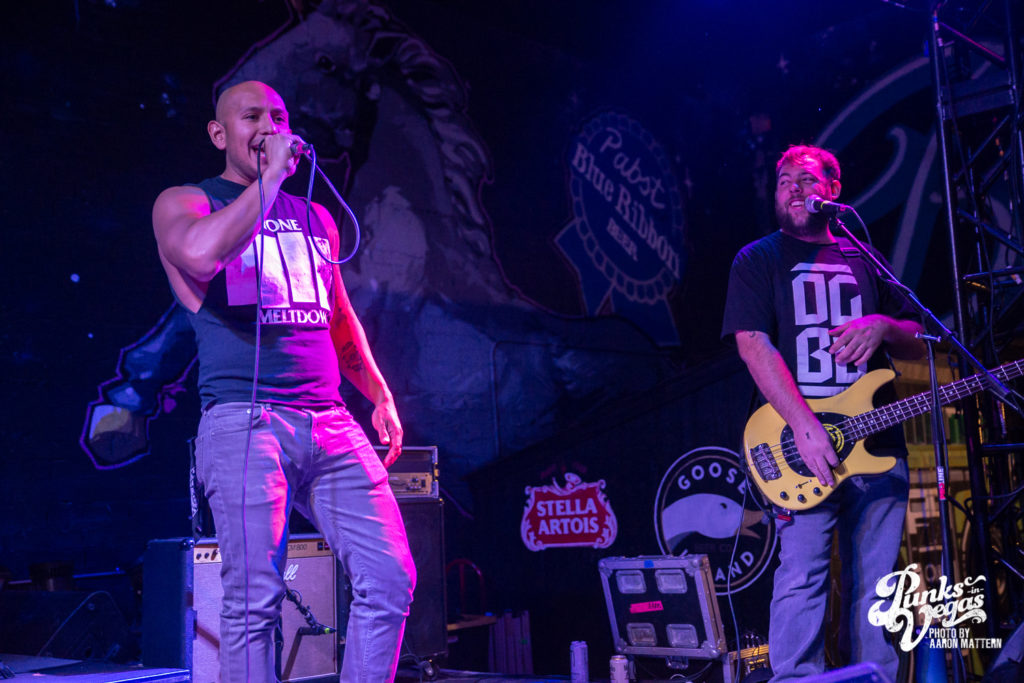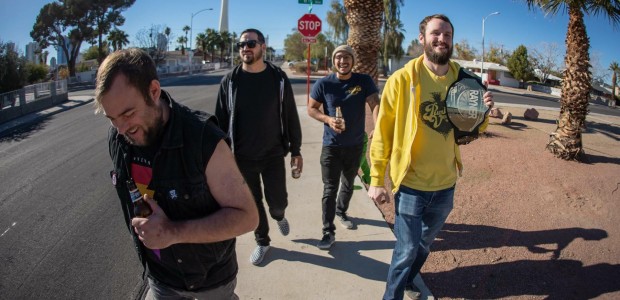If you know Las Vegas punk, you know Rayner. The pop punk quartet, comprised of stalwarts from Vegas’ punk scene has been cutting its teeth and building its cred—punk and beyond—since it formed in 2014. Rayner’s snappy four-chord surge and penchant for gritty introspection have manifested into a full-length (2016’s In Circles) and two EPs—Disaster and Scenery. The latter —three-song wallop released on May 10—was produced, recorded, mixed, and mastered by Jonas Vece at Second Born Sound. It’s an accurate representation of the new Rayner—a more open, dynamic, and wise version of the rowdy introspection for which they’re known.
Scenery comes on the heels of Rayner’s appearance at Pouzza Fest in Montreal, Canada. We checked-in with vocalist Dany ‘Panda’ Henrriquez and bassist/guitarist Rory Child about the release and festival appearance.

Rayner’s latest EP, Scenery, was released today. Congrats!
Dany ‘Panda’ Henrriquez: Thanks, man! We are all excited. We all agree that it’s our favorite quality of recording so far, and we also feel really happy with the writing. All around—guitar, bass, lyrics…
Rory Child: Oh, it’s 100 percent the best songs we’ve written. I know every band says that for everything they do as a group—which makes sense because logically, you should want to progress forward—but now I listen to older stuff and I’m just like “Ooh, this is bad!” [laughs].
How’s the reception thus far?
D: We’ve heard nothing but great things from everybody who’s heard it, which is awesome! Lots of the homies who have heard all the other stuff say that it follows the same mentality …
R: They’ll tell us if they don’t like it [laughs].
D: Yeah. I even got a message from Adam from Failing Up, and he says it’s the best thing he’s heard in awhile. That’s awesome, and it means a lot.
R: EPs are always hard to push, even if you go for reviews. An EP, to a lot of places like labels, is considered to be five songs—minimum. We were just trying to get something out in general. We thought, since we’re playing Pouzza [Fest], we should record something to have basically for free to give out to people.
It’s hard to push an EP, but it seems like people like it, which is cool. I like it, which is what matters, but when we play the songs live, people dig it. It’s an interesting dynamic because on the EP, I record guitar and bass. I played guitar before, so there are those lines, but live, we just wish these were there. I can’t do it. There’s no way to compensate for that, but it seems like we’ve figured it out and people like it.
Our friends can be harsh, which is good because they’ll tell you when they don’t like things or when things are bad.
What separates Scenery from other releases in Rayner’s discography?
D: We got lucky from the beginning because we looked into great recording places from the jump.
R: Having Dave, too. These are our first recordings with our drummer, Dave Bartlett, and the includes a lot of input—more so than you would think than a drummer. He wants to be part of the songwriting process, and that did some great things for the songs. He’s definitely more into doing different things, like stoppy parts, and it’s worked really well for the material we’ve written. It added an interesting dynamic to it; It’s something new.
D: He really focused on syncing up with bass, and its connection with the drums, which is very important.
R: I’m a bass player first and foremost. I’d write some great guitar parts, but I’d never feel good about playing them. Recording-wise, it’s fine, but these songs … we needed to get into the groove of being in the pocket again. That was such a goddamn relief to me! When it comes to rhythm guitar, I play a lot in the pocket—I sync up with the drums. This especially helps with Chris Piro (Guitars) who writes really intricate parts. I’m heavy-handed, so it works. The whole scenario of these songs just fell into place.
The main song, “Scenery,” was written with the light guitar intro in mind, and then it just grew from there. These songs are more organic in nature, as opposed to our other stuff, where we came to the table with ideas and parts written. These three songs are more in the vein of, “Hey, I have this part. Let’s feel this one out.” It’s something we haven’t done much of ….
D: That’s definitely the case with the song “Misdeeds.” That was completely put together piece-by-piece by the whole band.
R: These songs have fallen apart multiple times, and we’ve built them back up again. I think it makes it better. This time, we had the chance to fiddle around and try some new things. We got lost in a few, too [laughs]. It brings a new life to these songs, if that doesn’t sound pretentious.
D: I was writing against myself the entire time. On “Misdeeds,” I made a conscious effort to have a very different melody in the verse where I went really high. If you listen closely, the first and second verses don’t come back to the same melody. I did that just because I thought it would be fun to have two different melodies.
On the other hand, “Sunsets” was pretty much ready …
R: Yeah, I had the ideas, but as we’ve played more, it’s been “Here’s the idea, here’s what I’m trying to get out of it … let’s see what we come up with.” There was a lot of discussion in making this EP.
D: Yes. I think these three songs build off of collaboration, like we did in “Simplicity.” Now I feel comfortable taking things given to me by Rory, and I trust that he won’t feel like I’m bastardizing his ideas, concepts, or emotions.
R: It also has to do with being open, too. I used to be pretty bad about shooting down ideas, but now it’s a comfortable scenario where we try new things and trade input.
Jonas Vece also had some input. How was that experience?
R: It was the best experience out of everything else we’ve recorded. Jonas and John Brown (who recorded previous efforts) both had a lot of input, and they’d push us to try different things, like a lick here or there, or a fill. It’s always good to get another ear to help out. There’s a part in “Sunsets” where he’d jam along and work with us. It was great.
“Scenery” was already completed for so long. “Sunsets” was the newest one of that process—he was throwing guitar stuff in there, thinking of melodies, ways to approach the song … he even would talk through the way to attack different parts of the song while playing.
When it came to “Misdeeds” and the bridge, he suggested some stops on the drums that ended up changing a lot of the song, melody-wise, and the way things all meshed together. The song ended up so different, and it was awesome. He was never afraid to try new things and make different versions of songs.
Is that true for vocals, too?
D: Honestly, no. The best part of working with Jonas is his constructive feedback. I learned that when he says, “You can do better,” I take that as a compliment, and we hit it again until we get there.
R: When I first recorded backing vocals, Jonas stopped after I hit the first note, cracked up, and said, “I didn’t know Lemmy was in this band!” He pushed me, too, to try different ways to approach singing.

What about some of the lyrical themes?
D: Rory and I are kind of in the same place, which means we connect in terms of what we write about. I very much focus on introspective lyrics, and a someone who is educated in sociology, I fall back into Emergence Theory—the idea that everything I do as an individual is both a product of my society, but all of my decisions are my influence on the society. When I see an issue in the world, I see it as a problem that is systemic for all people. That’s why I focus on the individual. These songs reflect that sentiment.
The two songs I wrote on this release, “Misdeeds” and “Scenery” sort of inform each other. I was talking about being a grown-up, and the relationships that weren’t romantic; on “Sunsets,” Rory talks about being a grown-up and what that means with the relationship that you have with yourself. There’s a connection there.
We’ve always focused on the same kind of sentiment from our first album to today, which is wild, because it’s been six years!
R: You can analyze songs and see your growth as a person. And you just get older, and realize that approaching lyrics this is so naive and weird because it’s so different in retrospect to now. You can see growth. I don’t think we’ve become a different band. Every release has been a logical progression.
D: That underlying theme has stayed the same: Personal growth as a way of bettering yourself and your surroundings and community—Emergence Theory.
Talk to me about Pouzza Fest. How’d you get on that?
R: We went to Fest (Gainesville, Florida) our first year, and hit a few free shows—one of which was Maledroit and Gorilla Poublee. We met them, I forget how to spell his name …. We’ve hung out with that guy at some show every year for the past five years. Then one time, we were hanging out at a show, and he disappears. I look onstage and see that it’s him! That was wild to me.
This year, at another pre-Fest show I was hanging out with bassist/singer of Ash Williams, Pat (Erhard). He pointed us out to some of the people who put on Pouzza, and the organizer says, “you’re in Rayner!?” We had previously tried getting on before by sending him stuff over the years. So our friends kept talking to him and asking, “ Should they play?” I swear to God, the first day back from Fest, he emailed us, and that led to an offer. It’s so wild because I had no idea that guy set everything up. He plays in a band called Lost Loves that I really enjoy.
D: It really just came out of a sincere desire to hang out and get to know people. This band Direct Hit! is huge now, they stayed at my house way back when. Now we’re friends with them, and it’s kind of weird because they’re touring Europe and blowin’ up. And they’ll always help out. If they get asked “how about Rayner?” the response should be “Oh, that band doesn’t suck” [laughs].
R: It’s a weird scenario, and I’m sure a lot of it works this way. It’s genuine networking. We’ve never played Fest, but we go every year, and people always look at us as the Rayner guys or the Vegas people.
D: Yeah, we’ve got props now. I’ve got Sneaky Snake—a stuffed snake that I bring to shows now for the past three years. He’s started Bud Light Lime…
R: That’s a joke [laughs]. I like it, it’s fine. I made a wrestling belt … we’re good at gimmicks to distract people.
Who are you excited to see the most?
D: I’m the worst because I’m not prepared for this. There’s all the homies who are involved, which is really exciting …
R: Not Ash Williams—that’s for sure. Fuck those guys [laughs]. I’m skipping Spanish Love Songs’ set, too.
There’s just so many bands, it’s overwhelming, and it approached so quickly! I got married, I have work, and this thing is happening real soon. I like doing this thing at festivals where I wander into places and discover something interesting. I’m ready to roll the fuckin’ dice on so much of that. It’s always fun to see Against Me! or Andrew W.K., but we’ve seen so many of the bigger names, it’s time to dig into the other stuff.
D: I’m definitely making it a point to watch a bunch of French-Canadian bands. If I can’t understand you, great! [Laughs]. I’m also interested in some of the Canadian ska bands that they’re really pushing for out there … There’s Be Like Max from Vegas, and I gotta see them—they play the day before us.
R: We’re excited to see the country, too.
D: Oh, yeah. Definitely that. I also have this weird thing of checking out different venues. Back to music [laughs].
-Ian Caramanzana
Rayner photos by Aaron Mattern
‘Scenery’ is available now via Bandcamp. Pouzza Fest tickets are on sale now via their website.






No Comments